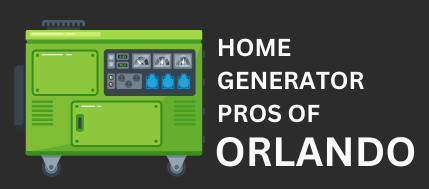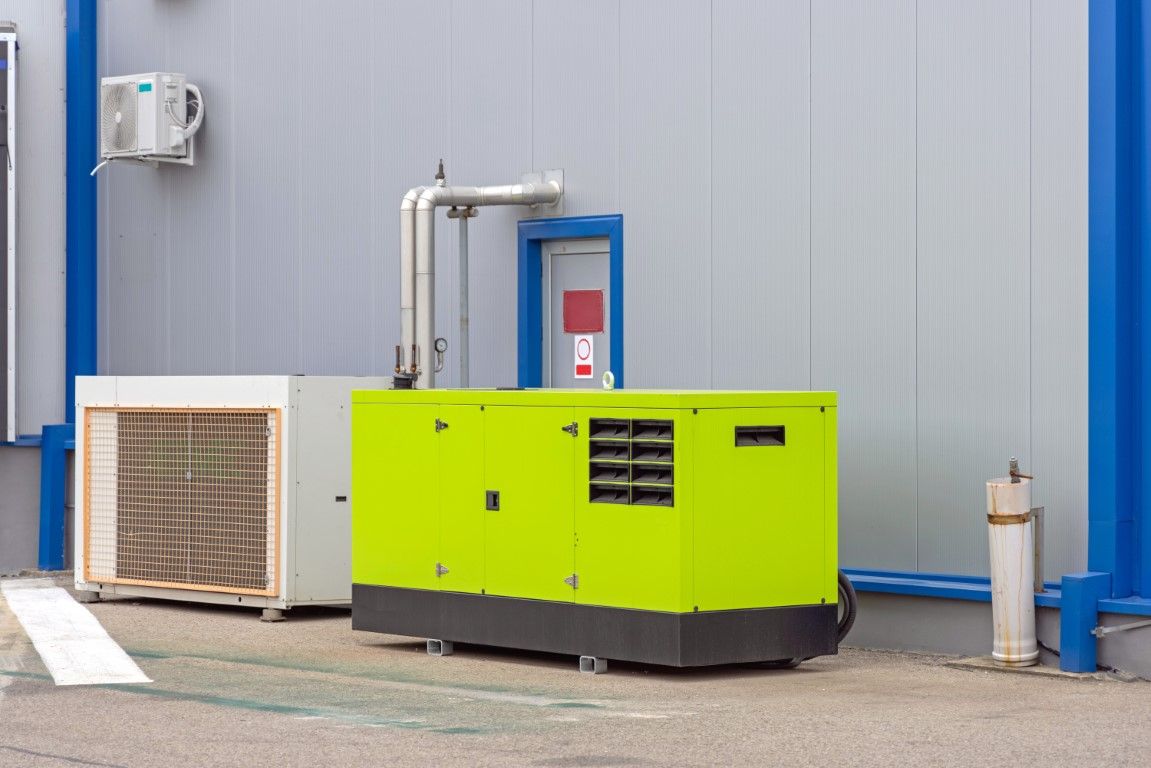
Commercial Generators in Orlando FL
Businesses operate around the clock and unexpected power outages can disrupt operations, having a reliable commercial generator is essential. A commercial generator is a heavy-duty power source designed to keep businesses running smoothly during power outages. Unlike residential generators, commercial models are built to handle higher power demands and provide a more reliable power supply. When considering a generator, think about your business’s power needs, the generator’s capacity, and how often it might be used.
Different Types
There are several types of commercial generators, each suited for different needs.
- Diesel Generators: These are popular for their durability and efficiency. They can provide high power output and are ideal for businesses that require a lot of electricity.
- Natural Gas Generators: These are often chosen for their cleaner operation and lower fuel costs. They are also a good option if you have a natural gas supply on-site.
- Propane Generators: These offer flexibility and can be used in areas where natural gas is not available. Propane is also clean-burning and efficient.
Each type has its own advantages depending on your business's power requirements and fuel availability.
Key Features to Consider
When selecting a commercial generator, consider its power capacity, fuel efficiency, and runtime. You should also evaluate the ease of maintenance, noise levels, and whether it has automatic transfer switches that allow the generator to start up automatically during a power outage. Additionally, ensure the generator has a reliable start system and is capable of running the equipment essential to your business operations.

We will get back to you as soon as possible.
Please try again later.
Professional Installation
Proper installation of a commercial generator is crucial for its optimal performance and longevity. Professional installation ensures that the generator is correctly connected to your power supply and complies with local codes and regulations. A qualified technician will handle the setup, including fuel connections and electrical wiring, and ensure that the generator is properly tested before it is put into service.
Key Maintenance Tasks and Schedules
Routine maintenance is vital to keep your generator in top working condition. Regular tasks include checking and changing the oil, inspecting and replacing filters, and testing the battery. It’s also important to run the generator periodically to ensure it operates correctly. Establish a maintenance schedule with a professional service provider to avoid unexpected issues and prolong the life of your generator.
Identifying and Resolving Common Problems
Common problems with commercial generators include fuel supply issues, battery failures, and mechanical wear and tear. If your generator fails to start, check the fuel levels and battery charge. Regular inspections can help identify potential issues before they become major problems. Always consult with a professional if you encounter persistent issues or if the generator shows signs of malfunction.
Choosing the Right Generator for Your Business
Selecting the right generator involves assessing your business’s specific power needs and understanding the types of generators available. Consider factors such as the size of your business, the critical nature of your operations, and your budget. A professional can help you analyze your requirements and recommend a generator that provides the necessary power and reliability for your operations.
Benefits of Having a Commercial Generator
Having a commercial generator offers numerous benefits, including uninterrupted power supply during outages, protection against data loss, and continuity of operations. It ensures that your business can continue to function smoothly regardless of external power issues, which can be crucial for maintaining productivity and customer satisfaction.
If you’re considering installing a
commercial generator in Orlando, FL or need support with an existing one, contact us today. Our team of experts is here to help you select, install, and maintain the right generator for your business needs. Ensure your business remains operational and secure with a reliable power solution.
How to Size a Commercial Generator for Optimal Performance
In today’s world, reliable power is crucial for businesses, especially in sectors where downtime can lead to significant losses. Whether you’re running a retail store, a manufacturing plant, or an office complex, having a dependable commercial generator is essential to ensure that operations continue smoothly during power outages. Properly sizing your generator is key to optimizing its performance, avoiding unnecessary costs, and ensuring it meets your power needs effectively. This guide will walk you through the process of sizing a commercial generator to ensure you get the most out of your investment.

Assess Your Power Needs
The first step in sizing a commercial generator is to understand your power requirements. Begin by identifying the critical equipment and systems that need backup power. This includes everything from lighting and HVAC systems to computers and machinery. To determine your power needs accurately, list all the electrical devices and their wattage requirements.
- Calculate Total Load: Add up the wattage of all equipment that will be powered by the generator. Make sure to consider both the running wattage and the starting wattage, as some equipment requires more power to start than to run.
- Consider Future Expansion: It’s wise to plan for future growth. If you anticipate expanding your operations or adding more equipment, choose a generator that can handle additional load to avoid having to upgrade later.
Understand Generator Ratings
Commercial generators come with different ratings, and understanding these is crucial. The two main ratings you need to be familiar with are:
- Running Wattage: This is the continuous power that the generator can supply while running. It should be able to handle the total wattage of all the equipment you plan to power.
- Starting Wattage: This refers to the extra power needed to start equipment. Some devices, like motors and compressors, need more power when they start up. Your generator should be able to handle these spikes in power demand.
Select the Right Type of Generator
There are various types of commercial generators, each suited to different needs:
- Standby Generators: These are permanently installed and automatically kick in when the main power supply fails. They are ideal for businesses that require constant power.
- Portable Generators: These are flexible and can be moved as needed. They are suitable for smaller operations or businesses that don’t need constant backup power.
- Inverter Generators: These provide clean, stable power and are often used in sensitive environments where power quality is crucial.
Consider Fuel Options
Generators can run on various types of fuel, including diesel, natural gas, and propane. The choice of fuel affects the generator’s efficiency, maintenance needs, and operating costs:
- Diesel Generators: Known for their durability and efficiency, diesel generators are often used in large-scale commercial settings. They require regular maintenance but are reliable for long-term use.
- Natural Gas Generators: These are cleaner and more environmentally friendly. They offer a steady supply of fuel but may have higher operating costs compared to diesel.
- Propane Generators: These are typically used in smaller applications or as backup to other fuel sources. They are clean-burning and require less maintenance but may not be as cost-effective for larger loads.
Factor in Location and Installation
The location where the generator will be installed plays a significant role in its performance. Consider these factors:
- Ventilation: Generators produce exhaust gases and heat. Ensure that the installation area has adequate ventilation to prevent overheating and accumulation of harmful gases.
- Accessibility: The generator should be easily accessible for maintenance and repairs. Ensure there is enough space around the unit for servicing.
- Noise Levels: Generators can be noisy. Choose a location that minimizes noise impact on the surrounding environment or consider noise-reducing enclosures.
Consult with a Professional
Sizing and installing a commercial generator can be complex. It’s often best to consult with a professional to ensure that you choose the right generator and install it correctly. A qualified technician can help with load calculations, recommend the best generator for your needs, and ensure proper installation.
Ensuring that your commercial generator is properly sized and installed is crucial for maintaining business continuity and avoiding costly interruptions. If you need assistance with sizing a commercial generator or have any questions about our services, don’t hesitate to reach out. Our team of experts is here to help you find the right solution for your power needs and ensure optimal performance for your business. Contact us today to get started and secure your business’s power supply with confidence.
How Commercial Generators Can Ensure Business Continuity During Power Outages
In today's fast-paced business environment, reliable power supply is crucial for smooth operations. Power outages, whether caused by severe weather, equipment failures, or other disruptions, can have significant impacts on businesses. For many companies, especially those with critical functions, a sudden loss of power can lead to operational downtime, financial losses, and damage to reputation. This is where commercial generators play a vital role. They provide a backup power source that ensures business continuity even when the main power supply fails.
Uninterrupted Power Supply
Commercial generators are designed to kick in automatically when the main power source is interrupted. This seamless transition from the main power to the generator minimizes downtime and ensures that operations continue without significant interruptions. By having a commercial generator in place, businesses can maintain essential functions, such as running critical equipment, lighting, and IT systems, during a power outage.
Protection of Sensitive Equipment
Many businesses rely on sensitive equipment and data systems that require constant power to operate correctly. A sudden power loss can lead to equipment malfunctions or data corruption, which may result in costly repairs and data recovery processes. Commercial generators help protect these assets by providing a stable power supply, thereby safeguarding valuable equipment and ensuring that data remains intact.
Enhanced Security
Security systems, including alarms, surveillance cameras, and access control systems, are essential for protecting business premises. During a power outage, these security measures can become inoperative, leaving the business vulnerable to theft or vandalism. A commercial generator ensures that security systems remain active and operational, providing continuous protection for the business.
Compliance with Regulations
Certain industries, such as healthcare and finance, have strict regulations regarding power reliability. For example, hospitals must have backup power to ensure that life-support equipment and other critical systems continue to function during outages. Commercial generators help businesses comply with these regulations by providing a reliable backup power solution, avoiding potential legal issues and fines.
Maintaining Customer Service
For businesses that rely on customer service, maintaining operations during a power outage is essential for customer satisfaction. Whether it's an e-commerce site, a customer service center, or a retail store, power outages can disrupt service and lead to frustrated customers. Commercial generators ensure that customer-facing operations remain functional, allowing businesses to continue serving their clients without interruption.
Cost Efficiency
Investing in a commercial generator may seem like a significant expense, but it can be cost-effective in the long run. The costs associated with downtime, lost revenue, and potential damage from power outages can far exceed the investment in a reliable generator. Additionally, many commercial generators are designed for fuel efficiency, which can help manage operating costs and reduce overall expenditure.
Ensuring business continuity during power outages is critical for maintaining operations and protecting valuable assets. Commercial generators offer a reliable solution to keep your business running smoothly when the main power supply is compromised. If you're considering investing in a commercial generator or need more information about how they can benefit your business, contact us today. Our team of experts is ready to assist you in finding the right generator solution to meet your needs and ensure uninterrupted power supply.
Let's Connect!
Power outages can be a real headache, especially if you're running a business from your home or have medical equipment that needs electricity to function properly. Don't get caught in the dark and without power. That's where Home Generator Pros of Orlando comes in. Our team of certified professionals will take care of all your home generator needs, from installation to maintenance and repairs. Don't wait until the next power outage to realize the importance of having a reliable backup generator. Call us today to schedule your consultation and get your home prepared for anything.